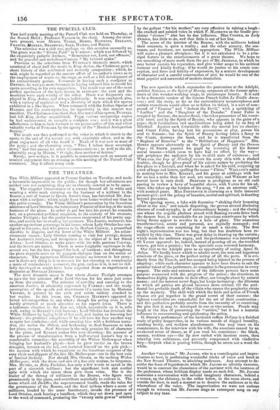THE THEATRES.
THE White Milliner appeared at Covent Garden on Tuesday, and made a favourable impression on the public ; for though her adventures are neither new nor surprising, they are so cleverly enacted as to be amus- ing. The singular circumstance of a woman dressed all in white and 'wearing a white mask carrying on the business of a milliner in the Bourse, a sort of bazaar in Queen ANNE'S time, has furnished Mr. JER- ROLD with a subject ; whieh might have been better worked out than in this petite comedy. The White Milliner's persecution by the licentious addresses of Lord Ortolan, the voluptuary Premier of that day, is the main business of the piece. In order to get her into his power, he commits her, on a pretended political suspicion, to the custody of his creature, Justice Twilight ; but the gaoler becomes enamoured of his pretty cap- tive, and assists her in evading her pursuers. The Justice, moreover, has another mysterious personage in his house, whom Lady Ortolan has con- signed to his care ; and who proves to be Herbert Conway, a proscribed Jacobite in disguise, and the lover of the White Milliner. An eclair- cissement ensues : Lady Ortolan coming to visit her protégé, detects her husband's intrigue, and recognizes in the object of it her friend Albina : Lord Ortolan, to make peace with his wife, pardons Conway, and the lovers are united. There is some laughable equivoque in the second act, but the first dragged for lack of incident ; and throughout, the piece depends more on its pungent dialogue than on the action or characters. The mysterious Milliner excites no interest in her story ; nor is there any thing in it to account for her choosing so conspicuous a mode of concealment : moreover, the plot, such as it is, is not so skil- fully developed as might have been expected from so experienced a
dramatist RS DOUGLAS JERROLD.
The most dramatic scene is that where Justice Twilight attempts to pass the fair prisoner off to Lord Ortolan for his niece just come np from the country. The mixture of servility and cunning in the amorous Justice, is admirably expressed by FARREN ; and the ready assumption of the speech and deportment of a rustic lass by Madame VEsTaus, is pointed by the arch and subtle raillery couched in her replies. In this scene, too, CHARLES Maznnws appeared to better advantage#than in any other ; though his acting even in this hardly attracted so much attention as his superb dress. There is a ludicrous situation in the first act, which, improbable as it is, tells well, owing to KEELEY'S rich humour : Lord Ortolan has detained the White Milliner by laying hold of her sash, and insists on knowing her history : she promises compliance if he will turn his face another way to spare her confusion ; and, while amusing hint with a fictitious narra- tive, she unties the ribbon, and beckoning to Saul Sneezum to take her place, escapes. Said Sneezurn is the only genuine bit of character in the piece, and KEELEY makes him very diverting : his account of the process of transformation from a half-starved doctor's boy to a comfortable rotundity—his courtship of the Widow Mellowpear when bringing her husband's physic—how he grew tender on the brown draughts, fervent on the red, and declared himself on the pale pink— the unction with which be expatiates on the luxurious snugness of the easy chair and slippers of the late Mr. Mellowpear—are in the best vein of farcical drollery. Nor should Mrs. ORGER, as the melting Widow Mellowpear, with the dress and airs of a fine city madam, be forgotten. Mrs. HUMBY, as Betty Furbelow, has only a few words to speak in the part of a shrewish milliner ; but the significant look and cordial spite with which she utters them give them value. She is the leader of the throng of milliners in the Bourse, who figure very prominently in the piece, and contribute materially to enliven it. The scene where old Doddles, the superannuated beadle, reads the rules for the governance of the Bourse, and the final tableau where a score of milliners, headed by the same functionary, invade the presence of Lord Ortolan, each bearing a bandbox, which they set down and open to the word of command, producing the "twenty satin gowns" ordered by the gallant "for his mother," are very effective in raising a laugh : the cracked and palsied voice in which F. MATHEWS as the beadle pro- claims "silence I" also has its due influence. Miss COOPER, as Lady Ortolan, has little to do, and that little is out of her line.
The scene of the interior of the Bourse, with the milliners behind their counters, is quite a reality ; and the other scenery, the cos- tumes, and furniture, are tastefully appropriate. The White Milliner will make a pleasant afterpiece; but it is not calculated to be a prin- cipal feature in the entertainments of a great theatre. We hope to see something of more mark from the pen of Mr. JERROLD, in which he may better sustain his reputation, and give wider scope to his satirical humour and kindly feeling: if he would do justice to his comic con- ception, and force and felicity of expression, by a mature development of character and a careful construction of plot, he would be one of the most popular and successful of modern dramatists.


























 Previous page
Previous page